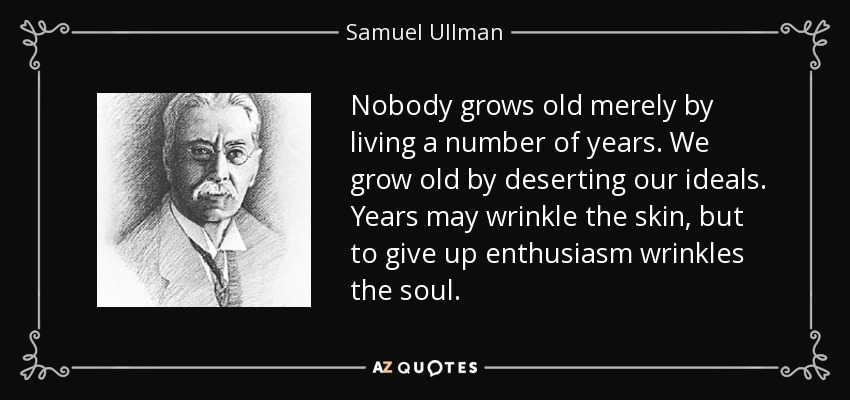风萧萧_Frank
以文会友年岁有加,并非垂老;理想丢弃,方堕暮年。
--- 王佐良译 塞缪尔.厄尔曼《青春》
老骥伏枥,志在千里;烈士暮年,壮心不已。
--- 三国 曹操
青春 YOUTH
作者: 塞缪尔·厄尔曼 Samuel Ullman 1840 -1924, 生于德国的美国作家。

儿时随家人移居美利坚,参加过南北战争,之后定居伯明翰,经营五金杂货,年逾70开始写作。著作有知名散文《青春》等。
这篇70多年前写的只有四百多字的短文,首次在美国发表的时候,引起全美国轰动效应,成千上万的读者把它抄下来当作座右铭收藏,许多中老年人把它作为安排后半生的精神支柱。

美国的麦克阿瑟将军在指挥整个太平洋战争期间,办公桌上始终摆着装有短文《年轻》复印件的镜 框,文中的许多的词句常被他在谈话或开会作报告时引用。
后来此文传到日本,文章的观点成为许多日本人生活哲学的基础。

松下公司的创始人松下幸之助说:“多年来,《年轻》始终是我的座右铭。”
Youth
by Samuel Ullman 1840 – 1924, he was an American businessman, poet, humanitarian. He is best known today for his poem Youth. http://www.prmvr.otsu.shiga.jp/library/master/samuelullman/youth.html
Youth is not a time of life; it is a state of mind; it is not a matter of rosy cheeks, red lips and supple knees; it is a matter of the will, a quality of the imagination, a vigor of the emotions; it is the freshness of the deep springs of life.
Youth means a temperamental predominance of courage over timidity of the appetite, for adventure over the love of ease. This often exists in a man of sixty more than a body of twenty. Nobody grows old merely by a number of years. We grow old by deserting our ideals.
Years may wrinkle the skin, but to give up enthusiasm wrinkles the soul. Worry, fear, self-distrust bows the heart and turns the spirit back to dust.
Whether sixty or sixteen, there is in every human being's heart the lure of wonder, the unfailing child-like appetite of what's next, and the joy of the game of living. In the center of your heart and my heart there is a wireless station; so long as it receives messages of beauty, hope, cheer, courage and power from men and from the Infinite, so long are you young.
When the aerials are down, and your spirit is covered with snows of cynicism and the ice of pessimism, then you are grown old, even at twenty, but as long as your aerials are up, to catch the waves of optimism, there is hope you may die young at eighty.
青春意味着勇敢战胜怯懦,青春意味着进取战胜安逸。年月的轮回就一定导致衰老吗?要知道呵,老态龙钟是因为放弃了理想的追求。
无情的岁月的流逝,留下了深深的皱纹,而热忱的丧失,会在灵魂深处打下烙印。焦虑、恐惧、自卑,终会使心情沮丧,意志消亡。
60岁也罢,16岁也罢,每个人的心田都应保持着不泯的童心,去探索新鲜的事物,去追求人生的乐趣。我们的心中都应有座无线电台,只要不断地接受来自人类和上帝的美感、希望、勇气与力量,我们就会永葆青春。倘若你收起天线,使自己的心灵蒙上玩世不恭的霜雪和悲观厌世的冰凌,即使你年方20,你已垂垂老矣;倘若你已经80高龄,临于辞世,若竖立天线去收听乐观进取的电波,你仍会青春焕发。
第四种版本
-- 三国 曹操
神龟虽寿,犹有竟时;
腾蛇乘雾,终为土灰。
老骥伏枥,志在千里;
烈士暮年,壮心不已。
盈缩之期,不但在天;
养怡之福,可得永年。
幸甚至哉,歌以咏志。
Samuel Ullman
Samuel Ullman (April 13, 1840 – March 21, 1924)was an American businessman, poet, humanitarian. He is best known today for his poem Youth, which was a favorite of General Douglas MacArthur. The poem was on the wall of MacArthur's office in Tokyo when he became Supreme Allied Commander in Japan. In addition, MacArthur often quoted from the poem in his speeches, leading to it becoming better known in Japan than in the United States.
Born in 1840 at Hechingen, Hohenzollern to Jewish parents, Ullman immigrated with his family, in 1851, to America to escape discrimination at the age of eleven. The Ullman family settled in Port Gibson, Mississippi. After briefly serving in the Confederate Army, he became a resident of Natchez, Mississippi. There, Ullman married, started a business, served as a city alderman, and was a member of the local board of education.
In 1884, Ullman moved to the young city of Birmingham, Alabama, and was immediately placed on the city's first board of education.
During his eighteen years of service, he advocated educational benefits for black children similar to those provided for whites. In addition to his numerous community activities, Ullman also served as president and then lay rabbi of the city's reform congregation at Temple Emanu-El. Often controversial but always respected, Ullman left his mark on the religious, educational, and community life of Natchez and Birmingham.
In his retirement, Ullman found more time for one of his favorite passions - writing letters, essays and poetry. His poems and poetic essays cover subjects as varied as love, nature, religion, family, the hurried lifestyle of a friend, and living "young." It was General Douglas MacArthur who facilitated Ullman's popularity as a poet - he hung a framed copy of a version of Ullman's poem "Youth" on the wall of his office in Tokyo and often quoted from the poem in his speeches. Through MacArthur's influence, the people of Japan discovered "Youth" and became curious about the poem's author.
In 1924, Ullman died at the age of 84 in Birmingham, Alabama.
In 1994, the University of Alabama at Birmingham and the Japan-America Society of Alabama opened the Samuel Ullman Museum in Birmingham's Southside neighborhood. The museum is located in the former Ullman residence and is operated by the University of Alabama at Birmingham.




